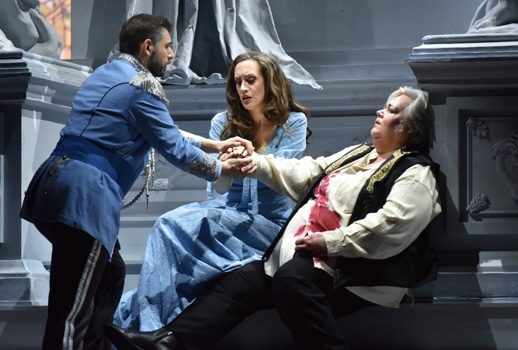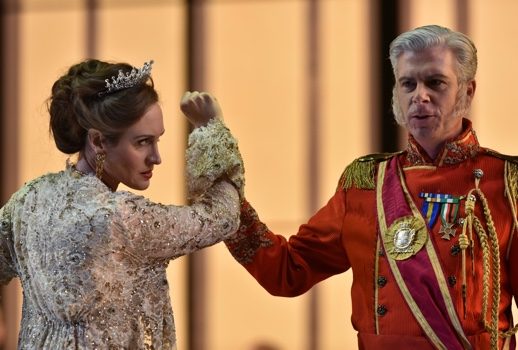
The opera even merits a mention in Byron. In Canto XVl of Don Juan we read:
The long evenings of duet and trios!
The admirations and the speculations
The “Mamma mia’s!” and the “Amor Mio’s”!
The “Tanti palpiti’s” on such occasions
The “Lasciamo’s” and the quavering “Addio’s.”
Byron added a funny footnote confessing to his love for Italian music but quotes the “mayoress” of a provincial town who objected to Italian singers and cried, “But your Italians! For my part, I loves a simple ballet!” But he does rather shrewdly suggest that Tancredi would have been a good deal better had Rossini taken more pains.
Rossini, a rising composer in Italy, demanded a big fee from the illustrious Fenice in Venice and settled for their counter proposal of 500 francs or about $300 in today’s money.
He wrote the opera in less than a month, naturally borrowing the overture from a comic opera (La pietra del paragone) and probably lifting a fair amount of other music from his early one acts as well. The first two performances were halted midway, the two stars were sick. Rossini used the ensuing 15 performances to rewrite and fine-tune the opera.
Rossini also used revivals to rework sections of the score. The most important of these was at Ferrara only a month after the world premiere. The libretto by Gaetano Rossi was based on Voltaire’s play about a war between the Byzantine Empire and the Saracens in 1006 and the tragic hero, Tancredi, banished and dispossessed as a result of intrigue.
He returns in disguise to save the day and reassure his beloved Amenaide—only to believe himself betrayed by a love letter she has addressed to a man she doesn’t name. (Naturally, she has trusted someone to deliver it to him in exile and hasn’t written his name to protect his whereabouts.)
Rossi and Rossini gave the work a happy ending much against the spirit of Voltaire. At Ferrara, Rossini was persuaded by the Romantic poet, Luigi Lerchi, to return to Voltaire’s tragic ending in which Tancredi achieves victory at the cost of his own life.
This ending is astonishing and completely unlike the writing Rossini was doing at the time in its devastating simplicity and weight. It was not a success however, and this version disappeared and was thought lost until 1976. The great musicologist Philip Gossett used this ending for the critical edition, writing a brief recitative himself. Marilyn Horne championed this edition and created a sensation by performing it first in Houston in 1977 and then in many other places.
Tancredi, given on February 10th, was a credit to Opera Philadelphia, who offered a well-considered and compelling production. This piece appeared to be the right scale of “mainstream” opera for this company which has struggled with more massive works.
The opera was updated to the time of its composition. The beautiful set by Daniel Bianco worked really well. It was shrewdly made, so that sections of it broke apart to create new scenes easily and through very well managed lighting by Eduardo Bravo actually provided a sense of different locations and atmospheres as well.

The orchestra was excellent. Winds were played with beautiful tone and great expression. Given their prominence in Rossini’s writing and the gorgeous solos written for them that was wonderful to hear. There was an excellent trumpet and the strings, usually rather weak in this sort of occasional orchestra, did very well. There was a marvelously voiced fortepiano deftly played by Grant Loehnig.
For once, the company’s music director, Corrado Rovaris, was freed from working hard just to keep things on track and was able to display deft, imaginative musicianship. He draw wonderful colors from his orchestra, caressed the many introductions to scenes and arias and throughout pointed and shaped phrases in a vivid, persuasive way. He offered the entire score, using the critical edition and ending with Tancredi’s death.
That was by far the best part of Stephanie Blythe’s performance. Finally, she showed nuance, haunting beauty of tone, and a fine control of dynamics. She still commands a remarkable instrument but her voice has lost the easy emission and rolling resonance that was so wonderful when she first came to prominence in the late 1990’s. She now sings with a “fixed” sounding massive chest adjustment facilitated by wide open vowels and huge breath pressure.
The impact of the sound is so imposing she often sounds like a Verdi baritone, and in fact that seems to be her range. But while she was tremendous (literally) in moments of martial assertion, this way of singing came at a considerable cost. There was something blaring in the sound, tiring at length, and limited in expression. Before her death scene there was very little dynamic gradation, few shifts in tonal color and no real ability to express the hero’s pathos, longing or emotional vulnerability.
The technique makes an essential elegance impossible, she was sometimes short of breath and tended to chop phrases up to belt them out rather than mellifluously shaping a seductive line. And yet there was that magnificent death scene. It was as if an entirely different artist had been hiding underneath that huge coat.
The part of Tancredi’s much tormented love, Amenaide, cast off by him through a jealous mistake and sorely oppressed by her hateful father, Argirio, is actually bigger than the hero’s; she has an enormous amount to sing. Brenda Rae, making her company debut, made a very strong impression. She has a very high set light soprano of impressive agility and dead on intonation (recent roles include The Queen of the Night, and Lulu).
Her tone takes on a particular radiance in the upper fifth of her range. She sang her long prison scene with wonderful line, great feeling and a beautiful sound. Even better was her later prayer, spun out breathtakingly. In this particular performance her voice seemed just a little on the small side both for the house (although the Academy of Music is not huge) and the role, where there are some emotional outbursts that needed more sound. Still, a lovely woman with genuine stage skills, she was most impressive—although crisper more colorfully inflected words and a “harder” rhythmic articulation would not only have seemed more stylish but perhaps have helped her project.
Amenaide’s father, Agiro, is a typical termagant, given to rage and brutality but he is written for a very high, florid tenor. Michele Angelini, making his company debut, bravely sang yards of really difficult music with confidence and aplomb. His voice is small and sweet and he didn’t force. It’s not really his fault that the writing needs a heftier, darker tone but most tenors with that sort of sound couldn’t survive the role.
Daniel Mobbs thundered effectively as the arch-villain, Orrazzano. Rovaris allowed both “confidants” their arias. Anastasiia Sidorova, a striking performer as Tancredi’s friend, Roggiero, sounded good but seemed nervous. Allegra di Vita, as Amenaide’s long suffering ally, had more to sing in general and in her aria projected an extremely lovely, haunting light mezzo-soprano.
Tancredi, uncut, is a long evening and there were defections during. The music, although often very beautiful, is that worst thing in today’s America: unfamiliar. T may be that Rossini’s opere-serie are most effective halved and hurled out by “knock your socks off” singers, especially in larger opera houses than the composer could have conceived. Still, if this wasn’t that sort of wild evening, there were substantial rewards and the whole was wonderful.
Photos: Kelly & Massa Photography


